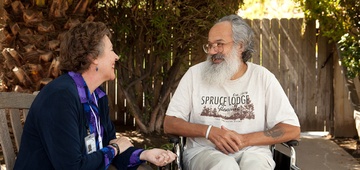
Giving the Patient Control
Patients with dementia experience many losses over time such as the loss of memories, independence, recognition of loved ones, and the ability to make their own decisions. These losses can lead to distress and agitation. Essential oils, combined with strategies to help trigger memories can reduce agitation and offer tremendous support to the patient and family. Aromatherapy can allow them to have a voice in their decision-making. At LightBridge we tailor a plan with each patient utilizing the essential oils that best resonate with them and their needs thereby allowing for a sense of empowerment as well as providing relief and comfort.
The Science Behind Aromatherapy
Aromatherapy utilizes essential oils and other aromatic plant compounds through inhalation or topical application to help improve health or mood. Although used as part of the healing arts in multiple cultures for centuries, aromatherapy started making an impact in the scientific and medical communities several years ago with research explaining the reasoning behind the benefits of this alternative medicine practice.
When used as an inhalant, the essential oil scent is carried to the olfactory nerve cells which send the aroma to the areas of the brain that help manage emotions and memory. This then releases mood enhancers like serotonin and endorphins, enhancing moods or soothing muscle tension.
The most powerful sense, smell directly interacts with the brain rather than the spinal cord as the other senses do. Because of this connection, smell is the strongest link to the subconscious and unconscious mind, making recognition of smells immediate. This also helps trigger memories.
When used through direct (topical) application to the skin, such as through a massage, the oils are absorbed by the skin, attached to fats and fluids and dispersed into the body’s systems. The antioxidant packed essential oils then enhances the immune system and offers relief to a variety of symptoms.
LightBridge Aromatherapy
At LightBridge we use only 100% pure essential oils based upon patients’ needs and desires. Our selection of oils is chosen specifically for their end-of-life benefits, and may reduce anxiety, insomnia, or nausea. Other oils may provide comfort, peace, or inner clarity.
A certified aromatherapist developed this program based on end of life care needs. We value the practice of aromatherapy, ensuring that all staff and volunteers are trained and have their own aromatherapy kits.
We incorporated aromatherapy into the plan of care for Dementia patients over seven years ago, launching it as the first alternative care in our integrated therapies services. We now offer several integrative therapies to enhance end-of -life care.
Most Common Oils & Application
The most commonly used essential oils for Dementia patients are:
Melissa- known as the Sweet Oil, Melissa is a distillation of fresh buds, leaves and twigs from the Melissa Officinalis, a perennial herb in the mint family. Melissa is used as an antidepressant, to reduce nausea and sooth agitation. At LightBridge we also use this oil to dispel fear and bring about acceptance.
Lavender- The most well known of essential oils, Lavender has been used through a variety of mainstream products such as soaps, perfumes and potpourris. In terms of medicinal uses, Lavender eases stress, insomnia and nervous tension. At LightBridge we use this oil to bring balance and harmony, thus reducing fear.
Frankincense- This essential oil comes from the extract of gum or resin from Frankincense or Olibanum trees. Frankincense helps the immune system, acting as an antiseptic to help prevent internal wounds and eliminate gas in the system. At LightBridge we use this oil to bring enlightenment, courage and peace.
Rose Hydrosol – This is a byproduct of steam dissolution of rose petals. Rose Hydrosol promotes cell repair and supports the heart. At LightBridge we use Rose Hydrosol to ease sadness and loneliness and provide comfort.
Our team delivers the oils through a variety of methods to take advantage of both inhalant and topical application based on the plan of care and patient’s preference:
Massage
Warm or Cold Compresses
Shampoos or Shower Gels
Cotton Balls at Bedside
Sprays
Conclusion
While we now have documented scientific evidence to support the proven benefits of essential oils, aromatherapy has been offering support and healing to people for centuries. Aromatherapy creates tremendous value for dementia patients, directly offering relief for both physical and emotional symptoms while reconnecting them with their memories.
In addition to helping ease symptoms of the patient, essential oils also help families during the bereavement process. Families often request their loved ones favorite scent to help them connect to memories of their loved one.
We have seen tremendous results, from easing pain and agitation to bringing acceptance and peace through the aromatherapy program.



